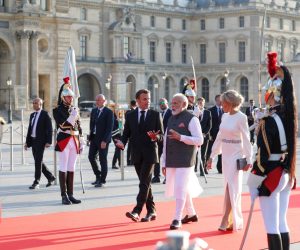The year 2023 was expected to establish India as a major diplomatic power. The fortuitous alignment of India’s presidency of the G-20 forum and the Shanghai Cooperation Organization (SCO) was expected to give the country the opportunity to not only showcase the progress that it has made but also to stamp its preferences on the global agenda through leadership of these two critical forums.
As I have argued on my YouTube show, Khanversations, this was to be a taste and a test of global leadership. While the G-20 is a global forum, the SCO is a China-centered group of non-western nations, a third of whom (China, Russia, and Iran) have adversarial relations with the U.S. The pomp and ceremony, the sequence of high-power meetings and finally the grand finales – the summit of heads of states and governments – were expected to rivet all eyes upon India, establish it as a major power in the multipolar world, and project Prime Minister Narendra Modi as a truly global leader.
But history is not unfolding as India desires.
India itself diminished the potential of the SCO summit and reduced it from a two-day in-person prominent event to a few hours-long virtual summit. According to Shyam Saran, a former foreign secretary of India, Chinese experts feel that India downgraded the SCO Summit to undermine China.
Furthermore, if one were to look at the speeches given by Xi Jinping, Vladimir Putin and Narendra Modi at the SCO summit and compare them to the final communique, the overwhelming influence of China becomes readily apparent as most of the Russian and Indian issues were sidelined. Additionally, India also emerged as the only nation in SCO that did not endorse China’s signature Belt and Road Initiative. India appeared to be isolated at a forum that it was presiding, while China was at its center.
While the SCO summit was clearly far from the success India had hoped for, the G-20 presidency is faring only marginally better. India has enjoyed success at the various midlevel functional summits, such as the summit on tourism in Srinagar, Kashmir. But at meetings of foreign ministers in March and of finance ministers in July, G-20 has emerged as a divided forum and failed to produce a consensus statement at the end of the deliberations. The divide between Western nations and the rest over the Russian invasion of Ukraine has undermined India’s agenda to address everything else but that. Indian ministers have not succeeded in their efforts to place the interests of the Global South at the forefront of issues and now there is fear in New Delhi that the crowning jewel, the national leaders’ summit in the Indian capital in September too might produce no grand outcome, as China and Russia are expected to thwart the U.S. and its allies from making Ukraine the main, if not the only issue. Suhasini Haider, a prominent Indian voice on world affairs argued on her show that there is a high likelihood that for the first time, a G-20 summit could end without consensus and a final communique.
However, when it comes to bilateral visits and trade agreements, India has enjoyed much success and raised its profile in essentially Western countries. Even though India claims to speak for the Global South, its prime minister visits more nations in the North than in the South. In 2023, Modi traveled to Australia, Japan, the U.S., France, Egypt, Papua New Guinea, and the UAE. The visits to Australia, France and the U.S. were very successful, and Modi was treated particularly well by the Biden administration.
Modi’s international tours are marked by two distinct characteristics: military sales to India and mobilization of the Indian diaspora that projects Modi as a very popular international leader. India signed deals worth billions of dollars for jet engines, drones, and cyber capabilities. While the amount for other items is not known, the drones alone cost $3 billion. On the Paris visit where Modi was the guest of honor for the Bastille Day celebrations, India negotiated a deal worth over $9 billion for seaborne fighter jets and submarines.
While Modi was celebrated by many from the Indian diaspora in all the Western countries, there were also protests by human rights activists who drew attention to India’s dismal record with regard to minority rights and religious freedoms. The BBC documentary on Modi’s role in the anti-Muslim violence in Gujarat, when he was chief minister, which was banned in India, was screened at the Australian Parliament and in the U.S. In the U.S., over 75 members of the U.S. Congress and Senate wrote to the Biden administration to raise the issue of India’s human rights record with Modi. Former President Barack Obama also spoke on this issue, essentially taking away much of the gloss of the Biden administration’s Modi festival.
The only nations where Modi is received these days without any mention of human rights are authoritarian states like UAE and Egypt.
While many commentators in India attribute this success in bilateral relations to so-called “Modi magic,” I think the reason why multilateral forums are immune to Modi’s diplomacy is simple – India succeeds in bilateral relations because they are with friendly nations happy to sell weapons and increase trade with India, while in multilateral forums India is yet unable to make its interests the interests of the world. Additionally, the presence of bigger powers like the U.S. and China in G-20 and Russia and China in SCO does not allow India to fully push its own agenda.

































